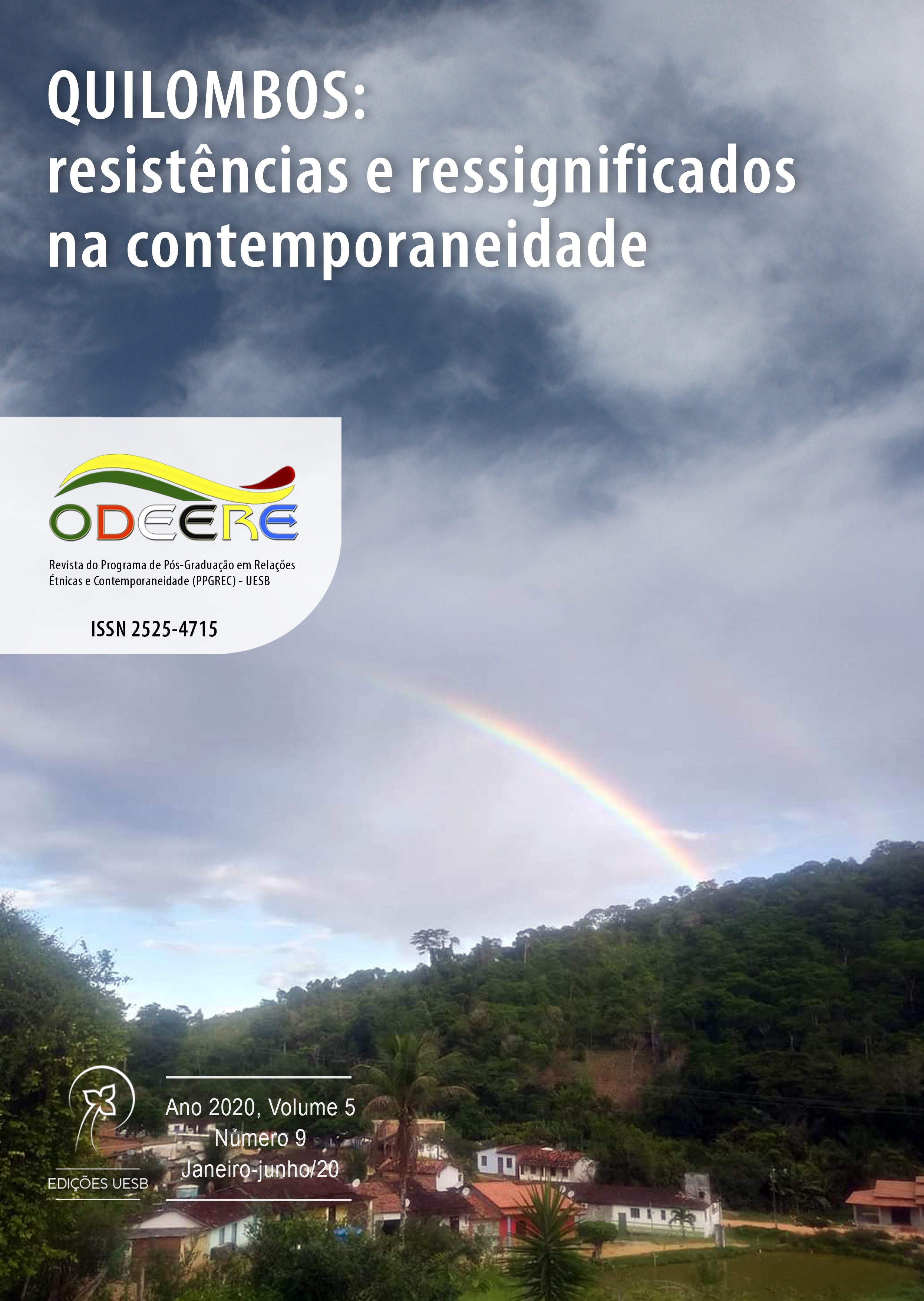The role of women in the remaininty Community of Kilombo of Fojo and its relation with nature
DOI:
https://doi.org/10.22481/odeere.v5i9.6515Keywords:
SustentabilidadeAbstract
This article is part of a Master's research in Environmental Sciences that investigated “The woman-nature relationship in the Remaining Community of Quilombo de Fojo, Itacaré - BA”, through the descriptive approach and quantitative and qualitative data analysis (KÖCHE, 2000; SANTOS , 2002), seeking theoretical deepening to deal with gender relations (LOURO, 2011; SCOTT, 1989), gender and environment (CASTRO and ABRAMOVAY, 2005) and the importance of the role of women in the daily organization of traditional communities, including remaining quilombos (COSTA and PINTO, 2015). The research subjects were women and men from the Fojo Community who decided to participate, using semi-structured interviews, direct and systematic observation and informal, in-depth conversations, conducted between 2014-2015. The section presented here aims to discuss the role of women in the Fojo quilombo community and its relationship with nature. The results indicate unequal relationships between men and women in the community, women have been assigned a role / position, ways of caring for the family, are responsible for “bringing harmony and peace to the home”, “caring and being a homemaker”, fitting to them the area belonging to the private - the house, some services in the fields and participation in the evangelical church, leaving the tradition forgotten. The relationship between women and nature, it seems, indicates wrong agricultural practices and, apparently, the residents' knowledge about agriculture is still timid, showing weaknesses in the techniques employed, lack of resources for the implementation of appropriate tools, lack of technical assistance. expertise and knowledge on the part of producers of basic production techniques
Keywords: Woman-Nature Relationship. Quilombola Woman. Sustainability
Downloads
References
ARRUDA, Ângela M. Silva. Uma contribuição às novas sensibilidades com relação ao meio ambiente: representações sociais de grupos ecologistas e ecofeministas cariocas. Tese (Doutorado em Psicologia Social). Universidade de São Paulo, USP, mar. 1997. São Paulo: USP, 1997.
BOFF, Leonardo. Sustentabilidade: o que é: o que não é. Petrópolis, RJ: Vozes, 2012.
BONETTI, Alinne; QUERINO, Ana Carolina. Apresentação. Dossiê Retrato das desigualdades de gênero e raça. Estudos Feministas. Florianópolis, v.17, n. 3, set./dez. 2009, p. 847-850. https://doi.org/10.1590/s0104-026x2009000300012
BOURDIEU, Pierre. A Dominação Masculina. Tradução Maria Helena Kühner. Rio de Janeiro: Bertrand Brasil, 1999.
BRASIL. Constituição da República Federativa do Brasil de 1988. Brasília, DF: Senado, 1998.
BRASIL. Decreto 6.040, de 07 de fevereiro de 2007. Brasília, DF, 2007. Disponível em: http://www.planalto.gov.br/ccivil_03/_ato2007-2010/2007/decreto/d6040.htm. Acesso jul. 2015.
BRASIL. Lei n. 9.795, de 27 de abril de 1999. Brasília, DF, 2007 Disponível em: http://www.planalto.gov.br/ccivil_03/leis/L9795.htm. Acesso em: jul. 2015.
CASTRO, Mary G. e ABRAMOVAY, Miriam. Gênero e Meio Ambiente. São Paulo: Cortez, 2005.
COSTA, João P. A.; PINTO, Benedita C. de M. Trabalho e organização social: a atuação de mulheres remanescentes de quilombolas de São José de Icatu, no município de Mocajuba, Pará. II Congresso Internacional de História UEPG – UNICENTRO, 2015.
Dicionário Web. Disponível em: http://www.dicionarioweb.com.br/fojo/ Acesso em: 4 ago. 2015.
FREYRE, Gilberto. Casa-Grande e Senzala: Formação da família brasileira sob o Regime da Economia Patriarcal, São Paulo: José Olímpio, 1987.
GADOTTI, Moacir. Pedagogia da Terra. Petrópolis, RJ: Editora Peirópolis, 2000. (Série Brasil Cidadão)
GEERTZ, Clifford. A interpretação das culturas. Tradução Fanny Wrobel. Rio de Janeiro: Zahar Editores, 1978.
GODINHO, Tereza M. O lugar da mulher no quilombo Kalunga. Dissertação (Mestrado em Ciências Sociais/Antropologia). Pontifícia Universidade Católica de São Paulo, São Paulo, 2008.
Instituto de Pesquisa Econômica Aplicada (IPEA). Retrato das desigualdades de gênero e raça. IPEA [et al]. 4. ed. Brasília, 2011. Disponível em: www.ipea.gov.br/retrato/pdf/revista.pd. Acesso em: 2 jul. 2015.
JACOBI, Pedro. Meio ambiente urbano e sustentabilidade: alguns elementos para a reflexão. In: CAVALCANTI, C. (Org.). Meio ambiente, desenvolvimento sustentável e políticas públicas. São Paulo: Cortez, 1997. p. 384-390.
Jornal Grande Bahia. Itacaré: Território Quilombola do Fojo tem relatório técnico publicado no DOU. Disponível em: http://www.jornalgrandebahia.com.br/2015/03/11. Acesso em: 22 jul. 2015.
KÖCHE, José C. Fundamentos de Metodologia Científica. Teoria da ciência e prática da pesquisa. Petrópolis, RJ: Vozes: 1997
LARAIA, Roque de B. Cultura um conceito antropológico. Rio de Janeiro: Jorge Zahar, 2000.
LEFF, Enrique. Saber ambiental: sustentabilidade, racionalidade, complexidade, poder. Tradução Lúcia Mathilde Endlich Orth. Petrópolis, RJ: Vozes, 2012.
LOURO, Guacira L. Gênero, sexualidade e educação. Petrópolis, RJ: Vozes, 2011.
MUNANGA, Kabengele. Por que o racismo e suas práticas e qual é a responsabilidade social que se espera dos profissionais que lidam com as questões da sociedade? In: Revista Brasileira de Psicologia, v. 2, n. 2, II PSINEP, Salvador, BA, 2015, p. 7-15.
O’DWYER, Eliane C. (Org.) Quilombos: identidade étnica e territorialidade. Rio de Janeiro: Editora FGV, 2002.
Organização Internacional do Trabalho. Convenção n. 169 sobre povos indígenas e tribais e Resolução referente à ação da OIT. Brasília: OIT, 2011, v.1. Disponível em: http://portal.iphan.gov.br/uploads/ckfinder/arquivos/Convencao_169_OIT.pdf. Acesso em: 28 jul. 2015.
PRIORE, Mary Del. História das mulheres no Brasil. São Paulo: Contexto, 2009.
PRIOSTE, Fernando; BARRETO, André. Território quilombola: uma Conquista cidadã. Brasília: SEPPIR, 2012.
ROSA, Waldemir. Sexo e Cor: categorias de controle social e reprodução das desigualdades socioeconômicas no Brasil. Revista Estudos Feministas [online]. Florionópolis, SC, 2009, v.17, n.3, set.-dez. 2009. p. 889-899. https://doi.org/10.1590/s0104-026x2009000300017
SANTOS, Izequias E. dos. Textos selecionados de Métodos e Técnicas de Pesquisa Científica. Rio de Janeiro: Impetus, 2002.
SANTOS, Maria J. dos. Mulheres quilombolas: Memória é acervo de nossa história. Cadernos Imbondeiro, João Pessoa, v.2, n.1, 2012.
SANTOS, Milton. A Natureza do Espaço: Técnica e Tempo, Razão e Emoção. São Paulo: Editora da USP, 2006.
SCOTT, Joan. Gênero: uma categoria útil para análise histórica. Tradução Guacira Lopes Louro. Educação & Realidade, v. 20, n. 2, UFGRS, jul.-dez,1995, p. 71-99.
Secretaria de Políticas de Promoção da Igualdade Racial da Presidência da República. A participação das mulheres negras nos espaços de poder. Brasília: SEPPIR, 2010.
SILVA, Rita de C. Maraschin da. Trabalho das Mulheres negras no Quilombo do Valongos/Tijucas-Santa Catarina. Revista Identidade, São Leopoldo, RS, v. 15, n. 1, jan.-jun. 2010.
SILVA, Tatiana Dias (Org.). Mulheres negras, pobreza e desigualdade de renda. Dossiê Mulheres Negras: retrato das condições de vida das mulheres negras no Brasil. Brasília: IPEA, 2013.
SORRENTINO, Marcos & TRAJBER, Raquel. ONG ECOAR- Instituto Ecoar para a Cidadania. São Paulo, mar. 1997.
SOUZA, Marina de M. e Souza. África e Brasil Africano. São Paulo: Ática, 2008.
TUBALDINI, Maria A. dos S.; DINIZ, Raphael F.; SILVA, Lussandra M. da. A importância do trabalho feminino para a Manutenção da Agricultura Familiar nas Comunidades Quilombolas de Minas Novas e Chapada do Norte – Vale do Jequitinhonha, MG. In: Laboratório de Geografia Agrária, Agricultura Familiar e Cultura Camponesa do IGC, UFMG, 2011.
Downloads
Published
How to Cite
Issue
Section
License
Copyright (c) 2020 ODEERE

This work is licensed under a Creative Commons Attribution 4.0 International License.
You are free to:
Share - copy and redistribute the material in any medium or format; Adapt - remix, transform, and build from the material for any purpose, even commercially. This license is acceptable for Free Cultural Works. The licensor cannot revoke these freedoms as long as you follow the terms of the license.
Under the following terms:
Attribution - You must appropriately give credit, provide a link to the license, and indicate if any changes have been made. You may do so in any reasonable way, but not in a way that suggests that you or your use is endorsed by the licensor.
There are no additional restrictions - You cannot apply legal terms or technological measures that legally restrict others to make any use permitted by the license.














